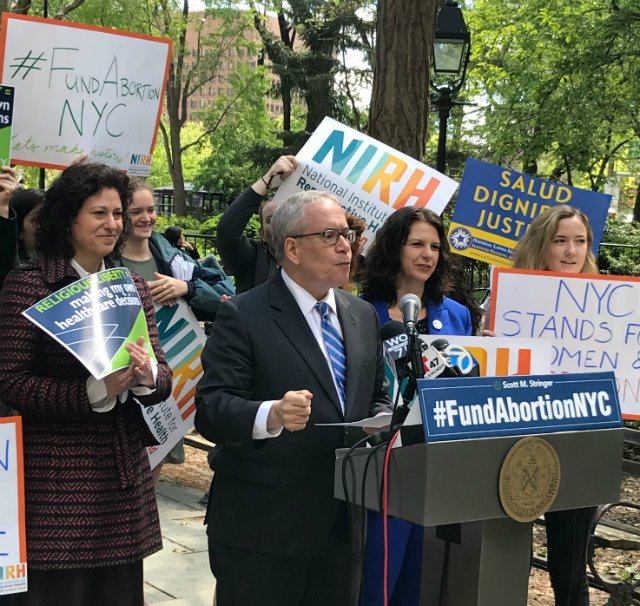NYC's Comptroller Wants Free Abortion Care For All Women Who Can't Afford It
May 16, 2019, 1:59 p.m.
Today, people coming from out of state account for a small but growing share of the abortions performed in New York City each year.

Comptroller Scott Stringer in City Hall Park on Wednesday
On the heels of new legislative attacks on abortion access across the country, New York City Comptroller Scott Stringer said Wednesday he is joining reproductive rights groups in calling for the city to allocate money in the upcoming budget to ensure that no one seeking an abortion here will be turned away for lack of funds.
The $250,000 the Comptroller is seeking would go to the New York Abortion Access Fund, an organization that covers the cost of an abortion for anyone who can’t afford one. About 37 percent of the people they served in 2017 came from out of state.
“People are raising money because they have to leave their states [to get an abortion],” Stringer said at a press conference at City Hall Park on Wednesday. “I want to be clear that when you come to New York and you have paid that fare for an airplane or train ride and you have the last few dollars in the bank, there will be no financial barrier to a safe abortion and health care.”
An investment of $250,000 isn’t much in the scheme of the mayor’s $92.5 billion proposed budget, but Caitlin Van Horn, a member of the board of directors at NYAAF, said it would make a big difference for the volunteer-run organization and the people it serves. With the $272,000 NYAAF pledged in 2017, it was able to help 590 people get abortions (the organization pays the money directly to the clinic where the person has an appointment).
Even though abortions are covered by New York’s Medicaid program, which insures low-income residents, there are still many reasons people who live here may turn to NYAAF, said Van Horn.
“If you have federal insurance coverage like Tricare, which is what our military uses, if you have VA coverage, or if you’re a federal employee, you cannot use your insurance for an abortion [in most cases],” Van Horn said. “Or maybe you’re uninsured or can’t use your insurance for privacy or safety reasons, or you just started a new job and your insurance doesn’t kick in for another month. Maybe you make too much money to qualify for Medicaid but still cannot afford the $400 to $7,000 an abortion can cost out of pocket.”
New York first became a destination for people from around the country to get abortions when the state legislature legalized the procedure in 1970, three years before the seminal Roe v. Wade Supreme Court decision establishing abortion access as a constitutional right.
Today, people coming from out of state account for a small but growing share of the abortions performed in New York City each year. The share of abortions provided to out-of-staters at the city’s Planned Parenthood affiliates grew from 2.2 percent in 2014 to 2.9 percent last year; out-of-staters received 3.9 percent of the abortions performed at the clinics from January through April of this year.
With recent legislation passed in other states, those numbers could grow. On Tuesday, Alabama’s state Senate passed a bill that would outlaw abortion at any stage of a woman’s pregnancy and wouldn’t even provide exceptions for cases of rape or incest. Earlier this month, the governor of Georgia approved a law that makes abortion illegal once a fetal heartbeat can be detected; similar heartbeat bills have passed in Missouri, Ohio, and Mississippi this year.
These measures have yet to be enacted and are already starting to face legal challenges, but Stringer said they inspired him to sign onto the #FundAbortionNYC campaign, which launched last year. He said he hopes the city can set a precedent for other municipalities to set up their own abortion funds.
A spokesperson for Speaker Corey Johnson declined to say whether the Speaker supports allocating the $250,000, but said that the Speaker is "horrified and infuriated by the war on women’s healthcare we’re seeing in this country."
"The Council has been steadfast in its support and funding of numerous reproductive health services providers over the years," the spokesperson said in a statement. "We will always stand on the side of a woman’s right to make her own healthcare decisions. We will work with the Administration to ensure that these rights are protected.”
Raul Contreras, a spokesperson for Mayor Bill de Blasio, told Gothamist, “In New York City, we’ll always fight to preserve a woman’s right to choose. We look forward to reviewing this proposal.”
Some opponents to abortion rights welcome the legal challenges so they can eventually get to the Supreme Court, potentially leading to a reversal of Roe v. Wade.
Andrea Miller, president of the National Institute for Reproductive Health, said at the press conference Wednesday that she doesn’t think the Supreme Court will overturn Roe outright, even though it has the votes to do so.
“My prediction is they will find a case that allows them to do everything but say they’re overturning Roe and instead gut it further so that the barriers to care will be so severe that abortion will be effectively outlawed in a number of states,” Miller said.